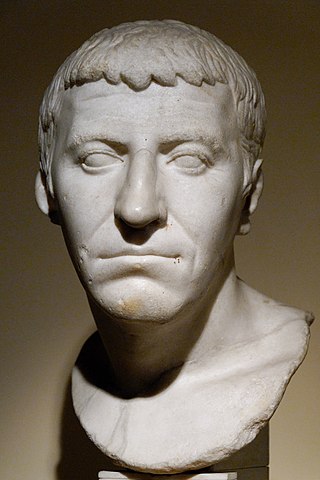Related Research Articles

Marcus Tullius Cicero was a Roman statesman, lawyer, scholar, philosopher, writer and Academic skeptic, who tried to uphold optimate principles during the political crises that led to the establishment of the Roman Empire. His extensive writings include treatises on rhetoric, philosophy and politics. He is considered one of Rome's greatest orators and prose stylists and the innovator of what became known as Ciceronian rhetoric. Cicero was educated in Rome and in Greece. He came from a wealthy municipal family of the Roman equestrian order, and served as consul in 63 BC.

Marcus Antonius, commonly known in English as Mark Antony, was a Roman politician and general who played a critical role in the transformation of the Roman Republic from a constitutional republic into the autocratic Roman Empire.

Marcus Licinius Crassus was a Roman general and statesman who played a key role in the transformation of the Roman Republic into the Roman Empire. He is often called "the richest man in Rome."

Gaius Cassius Longinus was a Roman senator and general best known as a leading instigator of the plot to assassinate Julius Caesar on 15 March 44 BC. He was the brother-in-law of Brutus, another leader of the conspiracy. He commanded troops with Brutus during the Battle of Philippi against the combined forces of Mark Antony and Octavian, Caesar's former supporters, and committed suicide after being defeated by Mark Antony.
Publius Cornelius Dolabella was a Roman politician and general under the dictator Julius Caesar. He was by far the most important of the patrician Cornelii Dolabellae but he arranged for himself to be adopted into the plebeian Cornelii Lentuli so that he could become a plebeian tribune. He married Cicero's daughter, Tullia, although he frequently engaged in extramarital affairs. Throughout his life he was an extreme profligate, something that Plutarch wrote reflected ill upon his patron Julius Caesar.
Titus Pomponius Atticus was a Roman editor, banker, and patron of letters, best known for his correspondence and close friendship with prominent Roman statesman Marcus Tullius Cicero. Atticus was from a wealthy Roman family of the equestrian class and from the Pomponia gens.
The Battle of Carrhae was fought in 53 BC between the Roman Republic and the Parthian Empire near the ancient town of Carrhae. An invading force of seven legions of Roman heavy infantry under Marcus Licinius Crassus was lured into the desert and decisively defeated by a mixed cavalry army of heavy cataphracts and light horse archers led by the Parthian general Surena. On such flat terrain, the Legion proved to have no viable tactics against the highly-mobile Parthian horsemen, and the slow and vulnerable Roman formations were surrounded, exhausted by constant attacks, and eventually crushed. Crassus was killed along with the majority of his army. It is commonly seen as one of the earliest and most important battles between the Roman and Parthian Empires and one of the most crushing defeats in Roman history. According to the poet Ovid in Book 6 of his poem Fasti, the battle occurred on the 9th day of June.

The gens Licinia was a celebrated plebeian family at ancient Rome, which appears from the earliest days of the Republic until imperial times, and which eventually obtained the imperial dignity. The first of the gens to obtain the consulship was Gaius Licinius Calvus Stolo, who, as tribune of the plebs from 376 to 367 BC, prevented the election of any of the annual magistrates, until the patricians acquiesced to the passage of the lex Licinia Sextia, or Licinian Rogations. This law, named for Licinius and his colleague, Lucius Sextius, opened the consulship for the first time to the plebeians. Licinius himself was subsequently elected consul in 364 and 361 BC, and from this time, the Licinii became one of the most illustrious gentes in the Republic.
Appius Claudius Pulcher was a Roman patrician, politician and general in the first century BC. He was consul of the Roman Republic in 54 BC. He was an expert in Roman law and antiquities, especially the esoteric lore of the augural college of which he was a controversial member. He was head of the senior line of the most powerful family of the patrician Claudii. The Claudii were one of the five leading families which had dominated Roman social and political life from the earliest years of the republic. He is best known as the recipient of 13 of the extant letters in Cicero's ad Familiares corpus, which date from 53 to 50 BC. They do not include any of Appius' replies to Cicero. He is also well known for being the older brother of the infamous Clodius and Clodia.
The gens Papiria was a patrician family at ancient Rome. According to tradition, the Papirii had already achieved prominence in the time of the kings, and the first Rex Sacrorum and Pontifex Maximus of the Republic were members of this gens. Lucius Papirius Mugillanus was the first of the Papirii to obtain the consulship in 444 BC. The patrician members of the family regularly occupied the highest offices of the Roman state down to the time of the Punic Wars. Their most famous member was Lucius Papirius Cursor, five times consul between 326 and 313 BC, who earned three triumphs during the Samnite Wars. Most of the Papirii who held office under the later Republic belonged to various plebeian branches of the family. Although the most illustrious Papirii flourished in the time of the Republic, a number of the family continued to hold high office during the first two centuries of the Empire.
Gaius Ateius Capito was a tribune of the plebs in 55 BC. He is known primarily for his opposition to the war against the Parthians launched by Marcus Licinius Crassus.
Licinia is the name used by ancient Roman women of the gens Licinia.

Quintus Caecilius Metellus Pius Scipio, often referred to as Metellus Scipio, was a Roman senator and military commander. During the civil war between Julius Caesar and the senatorial faction led by Pompey, he was a staunch supporter of the latter. He led troops against Caesar's forces, mainly in the battles of Pharsalus and Thapsus, where he was defeated. He later committed suicide. Ronald Syme called him "the last Scipio of any consequence in Roman history."

Publius Licinius Crassus was one of two sons of Marcus Licinius Crassus, the so-called "triumvir", and Tertulla, daughter of Marcus Terentius Varro Lucullus. He belonged to the last generation of Roman nobiles who came of age and began a political career before the collapse of the Republic. His peers included Marcus Antonius, Marcus Junius Brutus, Decimus Junius Brutus Albinus, the poet Gaius Valerius Catullus, and the historian Gaius Sallustius Crispus.
Censorinus was a friend and contemporary of Publius Crassus, son of the triumvir Marcus Crassus. His gens name was almost certainly Marcius, and he may have been the son of the Gaius Marcius Censorinus who was monetalis around 88 BC. If so, his father and uncle Lucius were staunch supporters of the popularist faction of Cinna.

The gens Caecilia was a plebeian family at ancient Rome. Members of this gens are mentioned in history as early as the fifth century BC, but the first of the Caecilii who obtained the consulship was Lucius Caecilius Metellus Denter, in 284 BC. The Caecilii Metelli were one of the most powerful families of the late Republic, from the decades before the First Punic War down to the time of Augustus.

The military campaigns of Julius Caesar constituted both the Gallic Wars and Caesar's civil war. The Gallic War mainly took place in what is now France. In 55 and 54 BC, he invaded Britain, although he made little headway. The Gallic War ended with complete Roman victory at the Battle of Alesia. This was followed by the civil war, during which time Caesar chased his rivals to Greece, decisively defeating them there. He then went to Egypt, where he defeated the Egyptian pharaoh and put Cleopatra on the throne. He then finished off his Roman opponents in Africa and Hispania. Once his campaigns were over, he served as Roman dictator until his assassination on 15 March 44 BC. These wars were critically important in the transition of the Roman Republic into the Roman Empire.
Marcus Licinius Crassus was a quaestor of the Roman Republic in 54 BC. He was the elder son of Marcus Crassus who formed the political alliance known as the "First Triumvirate" with Pompeius Magnus and Julius Caesar. His mother was Tertulla, the daughter of Marcus Varro Lucullus. His father and his younger brother, Publius, died at the Battle of Carrhae in 53 BC, after which time Marcus continued to be a partisan of Caesar.
The gens Laelia was a plebeian family at Rome. The first of the gens to obtain the consulship was Gaius Laelius in 190 BC.
Publius Licinius Crassus Dives was a Roman senator during the time of the First Triumvirate in the late Republic. He was the judge who examined in 59 BC the controversial affair of Lucius Vettius, who was supposedly involved in a conspiracy to assassinate the "triumvir" Pompey. Broughton supposed, on basis of this, that Dives had been a plebeian aedile in the previous year. Dives was a praetor in 57 BC, and, along with his other colleagues in office, supported the recall of the ex-consul Cicero from exile. He appears to have squandered a substantial amount of his wealth, causing Cicero to comment, in 59 BC, that his surname Dives was no longer appropriate for him. Valerius Maximus reported that Crassus went bankrupt and that the name "Dives" became a provocative taunt; this must have happened after his term as praetor.
References
- ↑ Cicero, Pro Scauro 40.
- ↑ Cicero, Ad Atticum 27 in the edition of Shackleton Bailey (= 2.7).
- ↑ Megabocchus et haec saginaria iuventus inimicissima est, in D.R. Shackleton Bailey, editor and translator, Cicero’s Letters to Atticus (Cambridge: University Press, 1965), note to 27. Saginaria ("from the fattening house", as for livestock) is a vexed reading sometimes given as sanguinaria, "bloody-minded." Shackleton Bailey thoroughly discounts the arguments of those who have seen "Megabocchus" as a possible nickname for Pompeius Magnus, as the context indicates a person of lesser stature.
- ↑ Plutarch, Crassus 25.3, 11–12.